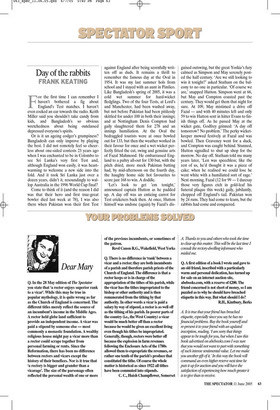Q. In the 28 May edition of The Spectator you
state that ‘a rector enjoys superior rank to a vicar’. While this may be true in popular mythology, it is quite wrong as far as the Church of England is concerned. The different titles merely reflect the source of an incumbent’s income in the Middle Ages. A rector held glebe land sufficient to provide an independent income. A vicar was paid a stipend by someone else — most commonly a monastic foundation. A wealthy religious house might pay a vicar more than a rector could scrape together from personal farming or rents. Since the Reformation, there has been no difference between rectors and vicars except the history of their benefices. Nor is it true that ‘a rectory is bigger and grander than a vicarage’. The size of the parsonage often reflected the personal wealth of one or more of the previous incumbents, or sometimes of the patron.
Revd Canon R.G., Wakefield, West Yorks Q. There is no difference in ‘rank’ between a vicar and a rector; they are both incumbents of a parish and therefore parish priests of the Church of England. The difference is that a rector keeps or is in charge of the appropriation of the tithes of his parish, while the vicar has the tithes impropriated to the bishop or other authority and is then remunerated from the tithing by that authority. In other words a vicar is paid a salary by way of stipend, a rector is as well off as the tithing of his parish. In poorer parts of the country (i.e., the West Country) a vicar would be much better off than a rector because he would be given an excellent living even though his tithes be impropriated. Generally, though, rectors were better off because the explosion in farm revenues following the Enclosure Acts of the 1780s allowed them to expropriate the revenues, or rather one tenth of the parish’s produce that constituted the tithe. Of course the whole matter is historical as since 1922 all tithes have been commuted into stipends.
C. C., Huish Champflower, Somerset A. Thanks to you and others who took the time to clear up this matter. This will be the last time I consult the rectory-dwelling informant who misled me.
Q. A first edition of a book I wrote and gave to an old friend, inscribed with a particularly warm and personal dedication, has turned up for sale on an internet auction site, abebooks.com, with a reserve of £200. The friend concerned is not short of money, so I am puzzled as to why he should have breached etiquette in this way. But what should I do?
R.H., Kintbury, Berks A. It is true that your friend has breached etiquette, especially since you say he has no financial problems. Buy the book yourself and re-present it to your friend with an updated inscription, reading, ‘I am sorry that things appear to be tough for you, but when I saw this book advertised on abebooks.com I was sure that you would not want to part with something of such intense sentimental value. Let me make you another gift of it.’ In this way the book will command an even higher reserve next time he puts it up for auction and you will have the satisfaction of experiencing how much greater it is to give than to receive.


















































 Previous page
Previous page